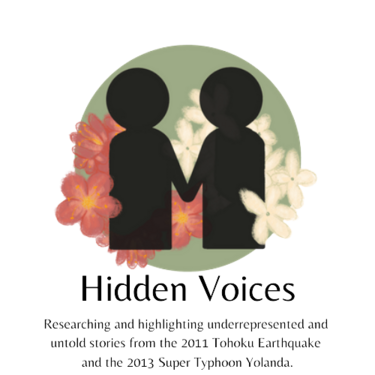✼ •• ┈┈┈┈┈┈┈┈┈┈┈┈ •• ✼

Figure 1. Cheree Quizon with her daughter during a rainstorm on the windswept seafront of Manila Bay in August 2009
Dr. Cherubim Quizon
(she/her)
Cherubim Quizon is an Associate Professor of Anthropology at Seton Hall University. She studies the knowledge systems and social formation of indigenous peoples vis a vis the nation-state through more than three decades of ethnographic fieldwork and museum research focusing on the Bagobo of Mindanao in the Southern Philippines.
Emphasizing agency in indigenous textile and sartorial practices, her most recent work focuses on the phenomenological perspectives of indigenous interlocutors explored through tourism (“The Color Purple” in Cosmopolitanism and Tourism, edited by RobertShepherd, Lexington Press, 2017), video (“The Weaver’s House: Ethnography, Translation, and Video in the Highlands of Mindanao” in visual Anthropology Review, 2019), and ethnobotany (co-authored with Fe Magpayo-Bagajo “Botanical knowledge and indigenous textiles in the Southern Mindanao highlands: method and synthesis using ethnography and ethnobotany” in Southeast Asia Research, 2021).
This collaboration with Dr. Gedacht is a new initiative arising from both personal and professional interests. She grew up in the mega city of Manila in the Philippines and lived with the regularity of alphabetically named typhoons that blast the country at the onset of the rainy season every year. Instead of snow days, she welcomed with other school children “typhoon signal no. 2” indicating no school for the day. Behind this naïve joy however is a constant awareness that news of suffering will soon follow, whether, in the number of dead from persistent floods, landslides, or wind destruction, or experiences of friends and their families who were afflicted.
Like other expatriates living in the US, when Haiyan (locally named Yolanda), made landfall in November 2013, she watched helplessly from afar as the unprecedented super typhoon wreaked havoc across the central islands of the Visayas and Northeastern Mindanao. She welcomes the opportunity for interdisciplinary collaboration with a historian like Dr. Gedacht and our undergraduate researchers, Ciana Vrtikapa and Wes Melian, as we explore fresh cultural, socio-structural, and methodological perspectives on narratives and textual interactions among individuals and communities in Japan and the Philippines who are customarily afflicted by named natural disasters.
✼ •• ┈┈┈┈┈┈┈┈┈┈┈┈ •• ✼

Figure 2 Anne Giblin Gedacht in Amman, Jordan (Feb. 2012 ) during a hailstorm.
Dr. Anne Gedacht Giblin
(she/her)
Anne Giblin Gedacht is an Associate Professor of History and Asian Studies at Seton Hall University. Her book, Tohoku Unbounded: Regional Identity and the Mobile Subject in Prewar Japan (Brill, December 2022), focuses on the creation of a distinctive Tohoku modernity between 1870s-1940s.
The 3.11.11 disaster in Tohoku is very real in her memory, as she had lived and worked in Iwanuma, Miyagi for a year as an English teacher with the JET Programme. While not in Japan proper during the event, much of Iwanuma, as well as neighboring Natori and Sendai, were inundated by the tsunami and the schools she used to teach at that remained were converted into temporary shelters and makeshift morgues. She spent the entire day (and weeks afterward) glued to her computer watching social media threads, following newspaper coverage, and mourning lost friends.
The rise in contemporary discourses of a Tohoku spirit (Tohoku damashii) in reportage of 3.11 proved one of the motivating influences for her current research on the phenomenon of “Named Disasters.” She also has connections to the Philippines, having done dissertation research in Davao and resided in Manila. She is no stranger to natural disasters having grown up with tornadoes in America’s Midwest, lived with regular earthquakes in Japan’s northeast, experienced a typhoon while in the Philippines, and once elected to NOT climb the volcano Mt Merapi outside of Yogyakarta, Indonesia, as it was actively smoking.
✼ •• ┈┈┈┈┈┈┈┈┈┈┈┈ •• ✼
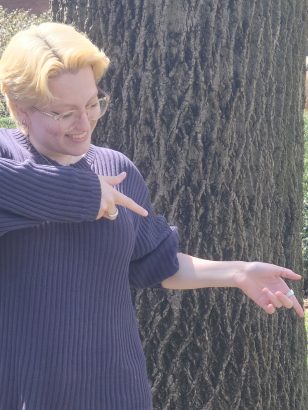 Cristina “Wes” Melian
Cristina “Wes” Melian
(they/he)
✼ •• ┈┈┈┈┈┈┈┈┈┈┈┈ •• ✼
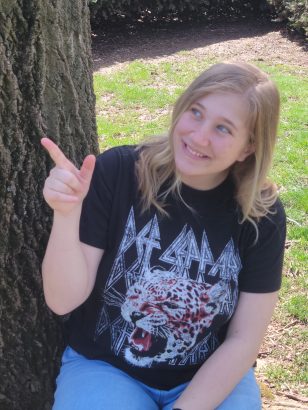
Ciana Vrtikapa
(she/her)
Ciana was a senior undergraduate student at Seton Hall University majoring in Anthropology, Classical Studies, and Philosophy. In 2016 she studied abroad in Hamamatsu, Japan, and fell in love with the language and the people. After taking some time to teach English in Japan with the JET program, she’s hoping to go to graduate school for Anthropology with her area of interest being East and South East Asia. Ciana led the project’s certification for ethical research in human subjects in Seton Hall’s Institutional Review Board (IRB) and coordinated with all four team members in individual certifications for using public data in research with human subjects. Together with Wes, she helped build the project blog. Her paper “Typhoon Yolanda: How “resilience” masks the voices of the vulnerable” was published in volume 5 (2022) in Locus: The Seton Hall Journal of Undergraduate Research. She has been accepted into the highly competitive Japan Exchange and Teaching Programme (JET) and looks forward to reacquainting herself with Japan when she begins her sojourn there in July 2022. She graduated with a BA degrees in Anthropology, Classica Studies and Philosophy in Spring 2022. Read more about Ciana and her follow Anthropology majors here.
✼ •• ┈┈┈┈┈┈┈┈┈┈┈┈ •• ✼
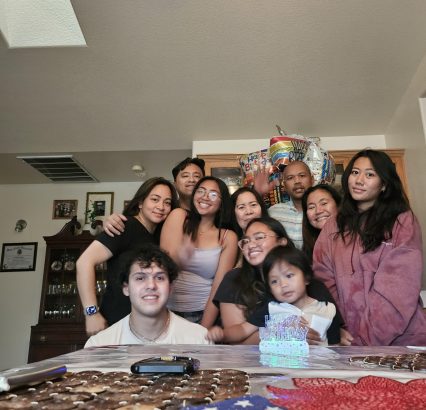
Frances Maris Jasmine Lofranco
(She/they)
Maris is an undergraduate student at Seton Hall University majoring in Political Science and Criminal Justice. She was born in the Cavite City, Philippines and moved to America when she was young. She grew up with both American and Filipino culture, so this project is very dear and close to her. Not only do they have a fondness towards the Philippines, but they also have a fondness in Japan as well. They have always been interested in different cultures and Japan was one of their favorites to learn. Her dad has served there and some of her family members have lived there. Although this is a different turn from her majors, Maris has always been a strong advocate for human rights and giving a platform for the underrepresented voices in the world. They are very excited to have this opportunity to take part in this research with a very strong and kind team. They hope gain experience and knowledge throughout this research journey.
✼ •• ┈┈┈┈┈┈┈┈┈┈┈┈ •• ✼
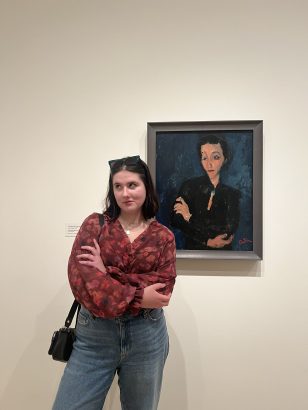
Helen Jakubowicz
(She/her)
Helen is a sophomore undergraduate at Seton Hall pursuing a double major in Anthropology and History and a minor in Art History. She is interested in East Asia and hopes to expand her knowledge about the East Asian art world, as well as give voices to underrepresented groups within the Philippines and Japan. She is excited to be a part of the team, and can’t wait to embark on this research journey.
